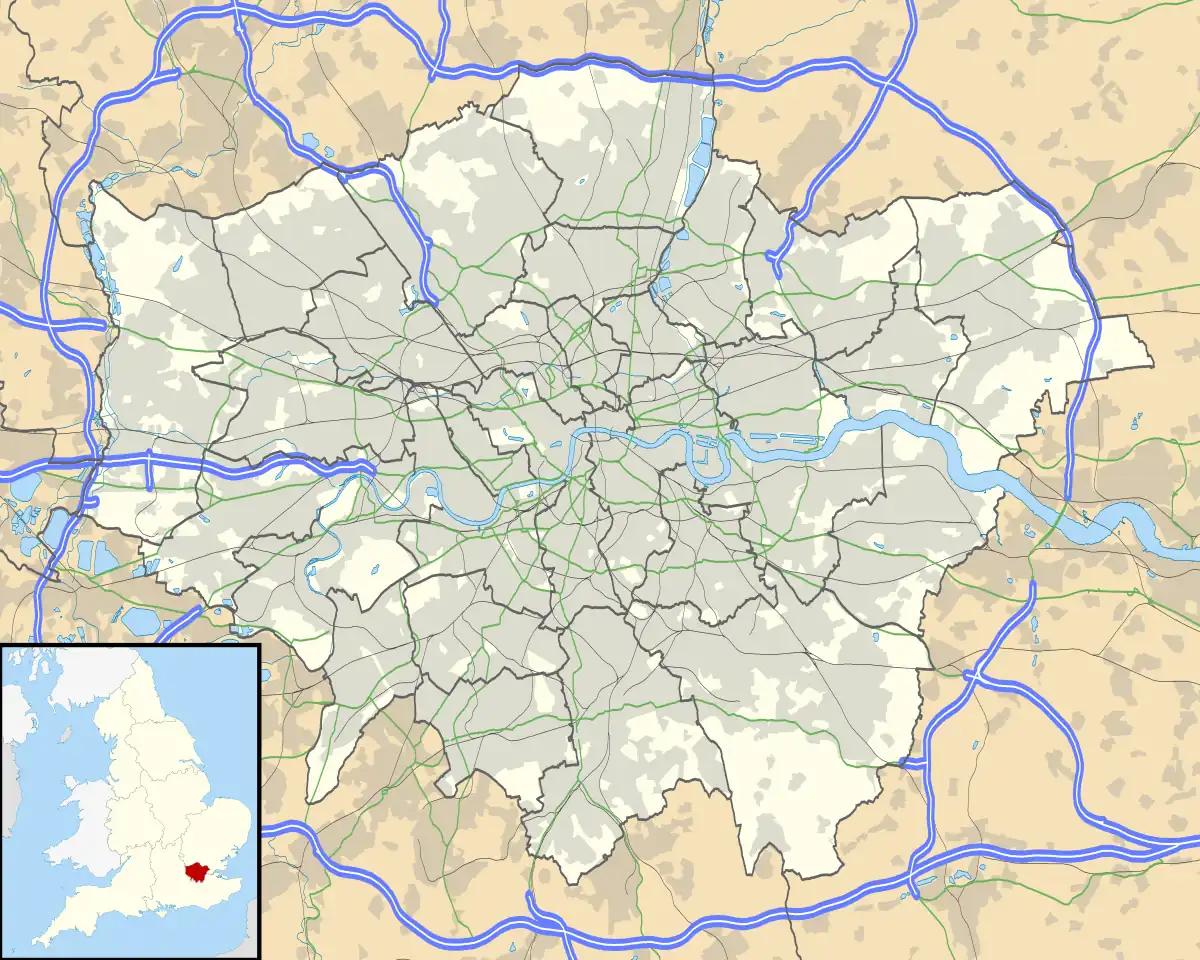Dissenters' Chapel, Kensal Green
Dissenters' Chapel, Kensal Green, is a working chapel with gallery attached in Kensal Green Cemetery, North Kensington, London. It is recorded in the National Heritage List for England as a designated Grade II* listed building,[1] and is under the care of the Historic Chapels Trust.[2]
| Dissenters' Chapel, Kensal Green | |
|---|---|
 Dissenters' Chapel, Kensal Green Cemetery | |
| Coordinates | 51.5269°N 0.2159°W |
| OS grid reference | TQ 239 824 |
| Built | 1831–34 |
| Built for | General Cemetery Company |
| Rebuilt | 1997 |
| Restored by | Historic Chapels Trust |
| Architect | John Griffith |
| Architectural style(s) | Neoclassical |
| Governing body | Historic Chapels Trust |
Listed Building – Grade II* | |
| Designated | 15 April 1969 |
 Location in Greater London | |
History
The chapel was the first purpose-built Nonconformist chapel to be built in a public cemetery.[1] The eastern spur of the cemetery was reserved for the use of dissenters.[3] A competition to build the chapel was won by Henry Edward Kendall, with a design in Gothic style. However the contract was awarded to John Griffith of Finsbury.[3] Griffith was surveyor to the General Cemetery Company, and his design was in Greek revival style.[4] The chapel was built between 1831 and 1834.[1]
During the Second World War the Chapel suffered severe bomb damage during an air raid. For much of the late half of the 20th century the fabric of the chapel was slowly deteriorating. Its wings were demolished in the early 1970s.[1] By the 1990s the building was "derelict and subject to vandalism".[5]
The building was leased to the Historic Chapels Trust in this poor state to enable a major restoration, completed in 1997. This included rebuilding of the wings, repair of the chapel's main body, and restoration of the historic painting scheme of the interior. A visitor centre was constructed in the north wing. The restoration was supported by generous grants from Historic England and was awarded an Environment Award from the Royal Borough of Kensington and Chelsea in 1997, and in 1998, a Europa Nostra Award.[2]
Architecture and setting
Kensal Green Cemetery is London's oldest public cemetery, dating from 1832. It is a listed at Grade I on the National Register of Historic Parks and Gardens,[6] and is a conservation area. The cemetery contains a large number of listed buildings in addition to the Dissenters' Chapel.[2] The chapel is constructed in Portland stone and rendered brick. At the front is an Ionic tetrastyle portico with a pediment. On each side of the portico are three-bay wings, with paired pilasters along the front, and twin Ionic columns in the antae at the sides. Inside the chapel are modern pews, a pulpit and a reading desk. Along the east wall are pilasters. Under the chapel is a partly sealed catacomb.[1][3]
Present-day uses
The chapel is now managed on behalf of the Historic Chapels Trust by the Friends of Kensal Green Cemetery, who make it available for funerals and organise a programme of art exhibitions, open days, evening lectures, and private events. The chapel forms the conclusion of the tours of the cemetery organised by the Friends.[3]
References
- Historic England, "The Dissenters' Chapel, Kensington (1080628)", National Heritage List for England, retrieved 12 July 2013
- The Dissenters' Chapel, Kensal Green Cemetery, Historic Chapels Trust, retrieved 7 July 2010
- Kensal Green Cemetery: Monuments, The Friends of Kensal Green Cemetery, retrieved 7 July 2010
- The Architectural Competition, Friends of Kensal Green Cemetery, archived from the original on 28 February 2012, retrieved 12 July 2013
- Dissenters’ Chapel, Kensal Green Cemetery, The Heritage Alliance, retrieved 7 July 2010
- Historic England, "Kensal Green (All Souls) Cemetery (1000817)", National Heritage List for England, retrieved 12 July 2013